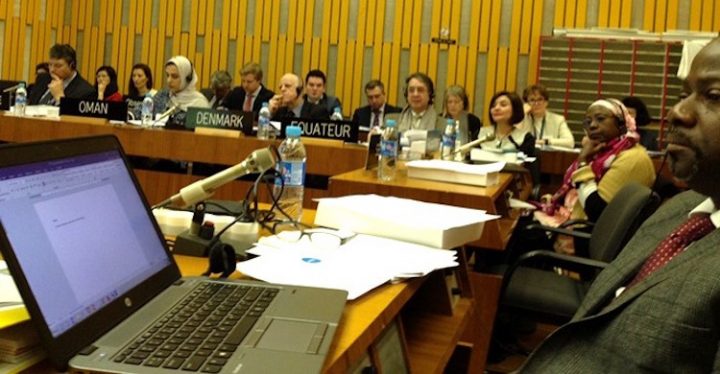By Fackson Banda
Fackson Banda is Programme Specialist in the Bureau of UNESCO’s International Programme for the Development of Communication (IPDC).
PARIS (IDN) – As social media expands, journalism is more special than ever: This is the conviction expressed by participants at the United Nations Educational, Scientific and Cultural Organization (UNESCO) colloquium, aptly titled ‘Journalism under fire: challenges of our times’.
The event took place on March 23, a day after the bureau of UNESCO’s International Programme for the Development of Communication (IPDC) wound up its 61st meeting, having approved support for almost 50 media projects especially in Least Developed Countries (LDCs) and Small Island Developing States (SIDS).
Funding grassroots media development partly reflects the interest by the international community in countering the growing tendency towards de-legitimising the role of journalism by the ‘fake news’ mantra.
The approved projects show a diverse range of interests, from amplifying the voices of the marginalized through radio in Uganda, countering hate speech in Yemeni and protecting the safety of journalists in El Salvador.
Other examples on the list: empowering investigative capacities of local alternative media in Serbia, through to strengthening media assessment capabilities to advocate for a gender-sensitive media system in Bhutan.
These are practical steps to build the capacities of media organisations so that they can perform their functions competently in what is sometimes called the ‘post-truth era’.
At the core of this characterisation of our times is the widespread penetration and usage of social media, which has enabled the circulation of falsehoods on an unprecedented scale – often overshadowing real news produced by professional journalists.
Nevertheless, social media are an opportunity and not only a problem to build informed communities, several speakers were keen to emphasise during the colloquium.
Against this backdrop, and listening to the debates, five key points became evident.
First of all, the point was made that journalism in current times needs to open its eyes wider to the broader loss of trust in institutions. As noted by Yascha Mounk of Harvard University, many political scientists and media were out of touch with dynamics that produced the outcomes of recent polls.
Vincente Jiménez of the Spanish Cadena SER highlighted a widespread loss of confidence in representative democracy and corporate elites, and the desire by many people to engage in direct democracy through social media.
However, if journalism is to be king of informational content online, it must sit on the throne of ‘fair, credible and accurate reporting’, according to one of the colloquium speakers, Serge Schmemann of the New York Times.
A second point made at the colloquium was that in addition to ongoing restrictions on journalism, there is an increase in attacks on press freedom. Maria Ressa, founder of Rappler media in the Philippines, spoke about the avalanche of intimidation on social media she received.
At the same time, she said, the very success of her media outlet was because it could use the platform offered by Facebook.
A third point addressed in the UNESCO colloquium was that human beings can do more to control how the algorithms of technology shape the information environment. Facebook’s Richard Allan noted that his company’s algorithms followed the choices of individuals and their online circle of friends.
He looked to news literacy, and not regulation of Internet platforms, as a way to empower people to know how their online behaviour affected computer algorithms based upon their own personal preferences.
Fourth, journalism should be more present across social media space, the colloquium heard. Al Jazeera’s Giles Trendle argued that journalists need to better utilise social media platforms like WhatsApp, Snap Chat, Instagram, and others, but without compromising their commitment to professional ethics.
In this regard, Verashni Pillay of the Huffington Post, South Africa, cautioned that stretched newsrooms needed to prioritise where to put effort into social media, and the ethical dangers of adopting social media culture of instant reporting.
Fact-checking too could make better use of graphics and memes, when reporting its findings on social media, according to Evangelina de Bourgoing of the Global Editors Network.
Effective use of social media for journalism was explained by Andrius Tapinas, founder and CEO of Liberty TV in Lithuania. His experience was that social media opened doors to reach new audiences who would volunteer donations to support credible and politically unbiased news.
Fifth, the colloquium heard arguments that another part of the solution was for journalism to provide a clear alternative to misinformation, by reflecting civil society, diversity and plurality, according to Ginna Lindberg of Swedish Broadcasting, and Lina Chawaf of the Syrian Rozana Radio.
At the core of this is the need to reinvigorate journalism as a reliable method of verification that can give humanity the credible information and insight needed to move beyond polarisation into dialogue.
“Truth is something we build together through dialogue,” said UNESCO Assistant Director-General for Communication and Information, Frank La Rue.
That’s the value of media development, producing reliable journalism as a basis for dialogue. Exactly like the projects that in the week beginning March 20 secured grants from UNESCO’s IPDC. [IDN-InDepthNews – 24 March 2017]
Related article: UNESCO Pits Media Development Against Fake News
Photo: After examining 114 project proposals submitted by local organizations in developing countries, the 61st Meeting of the IPDC Bureau in Paris approved 45 new projects the week beginning March 20. Credit: UNESCO
IDN is flagship agency of the International Press Syndicate.










